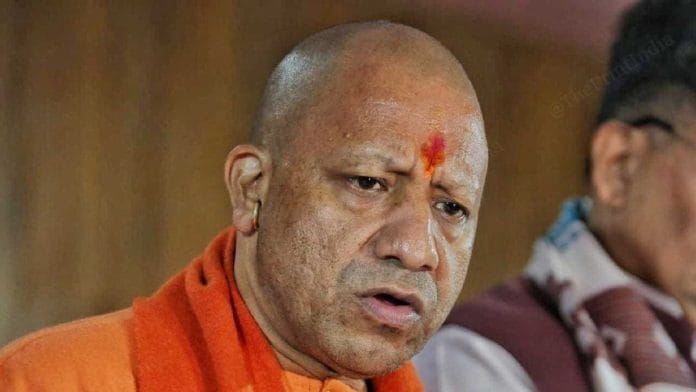New Delhi: The Yogi Adityanath government in Uttar Pradesh has come out with new rules for the appointment of the director general of police (DGP), a move that virtually frees it from any interference by the Centre in this matter. The state cabinet’s decision, however, has drawn snide reactions from the Opposition, with the Samajwadi Party (SP) leader Akhilesh Yadav telling the media that “all is not well between Delhi and Lucknow”.
”Amit Shah wanted his own DGP and Yogi wanted his own, so there was a rift. Hence, Yogi has brought these guidelines,” Rajya Sabha MP Sanjay Singh of the Aam Aadmi Party (AAP) told reporters Tuesday.
According to new guidelines cleared by the state cabinet, a committee headed by a retired high court judge will decide the state’s new police chief, meaning that the state government need not send a list of names to the Union Public Service Commission (UPSC) for selection.
Earlier, the state government had to send the list of eligible officers to the UPSC, which shortlisted three names and sent them to the state, after which it could choose one of them.
Given the composition of the UPSC panel—chairman, Union home secretary, sitting DGP of the state, sitting chief secretary and a member of the Central Armed Police Forces (CAPF) who is not of the cadre of the state for which a DGP is to be decided—the Centre used to have a decisive say in the appointments of state DGPs.
Many states, including UP, opted for acting DGPs, which allowed them to circumvent the Centre’s influence.
According to the new rules cleared by the UP cabinet, the selection committee headed by a retired high court judge will consist of the chief secretary, a person nominated by the UPSC, the UP Public Service Commission chairman or their nominee, an additional chief secretary or principal secretary (Home) and a retired DGP.
The cabinet brief note says the objective of the new Appointment Rules, 2024, is to establish an independent and transparent mechanism for the appointment of DGP to ensure that the process is free of political or executive interference.
In practice, government functionaries say, this means that the state will now have full control in the selection and the Centre won’t interfere.
Current DGP Prashant Kumar is the fourth DGP appointed in the past two and a half years. The successive appointments of four acting DGPs (D.S. Chauhan, R.K. Vishwakarma, Vijay Kumar and Prashant Kumar) in such a short duration suggest differences between the state and the Centre when it comes to naming the police chief, functionaries in the Opposition told ThePrint.
With these rules in place, Prashant Kumar, who is considered close to the chief minister, may be made the full-time DGP for a fixed two-year tenure, sources in the state government told ThePrint. The minimum tenure of the DGP will be two years, according to the new amendment. The vacancy notification can be put up only when the candidates have six months of service remaining.
Only those officers who are currently serving in the DG role at level 16 in the pay matrix will be considered, the guidelines say.
According to sources in the state government, Kumar fulfils the eligibility criteria under the new guidelines to become a full-time DGP.
If he becomes a full-time DGP, he can serve for a minimum of two years.
Sources also said that if everything goes to plan, there is every possibility that the 2027 assembly elections in UP will be held with Kumar as the DGP.
Taking a dig at the guidelines, SP chief Yadav said in a statement Tuesday that it is an attempt by the state government to take the reins from Delhi into its own hands.
He added: “I have heard that arrangements are being made to give a permanent post to a senior officer and extend his tenure by two years. The question is whether the person (Yogi) making the arrangements will himself stay for two years or not.”
Also Read: After SIT, UP launches district-level probe into funding of Islamic schools near Nepal border
Government assures it’s following the rule book
According to state government functionaries, this initiative aligns with the Supreme Court’s directive in Prakash Singh & Others vs. Union of India (Civil Petition No. 310/1996), where the apex court called for the enactment of a new police law that would ensure the police system is free of external pressures, safeguard citizens’ rights and uphold the rule of law.
In 2006, the Supreme Court, while announcing its decision after hearing Prakash Singh’s petition regarding police reform, issued notice to state governments for structural changes.
According to former UP DGP Prakash Singh, the state government’s new guidelines are in line with the Supreme Court’s decision.
He added that with this decision, UP has joined states like Punjab and Andhra Pradesh, although the processes are different in each.
(Edited by Radifah Kabir)
Also Read: In UP, appraisals of DMs & DCs now linked to how much investment they draw to their districts







CS and DGP should always be appointed by the democratically elected state government. The Centre has no role to play, beyond releasing from deputation an officer the state might wish to appoint.